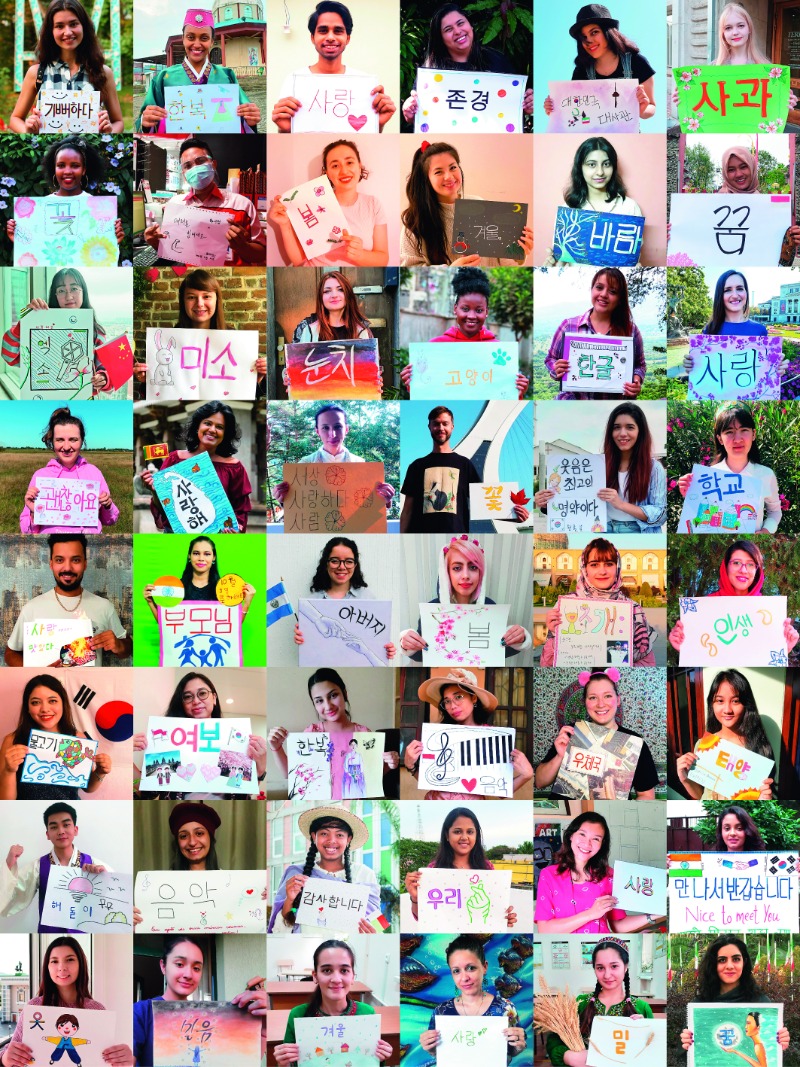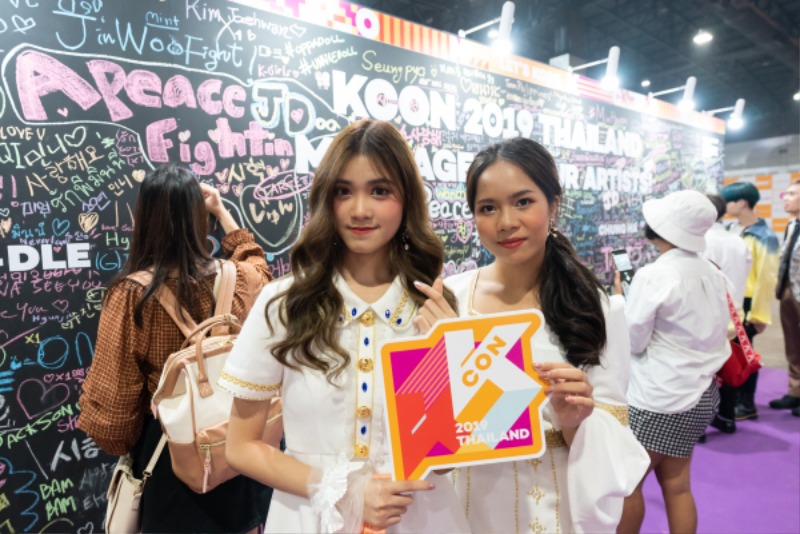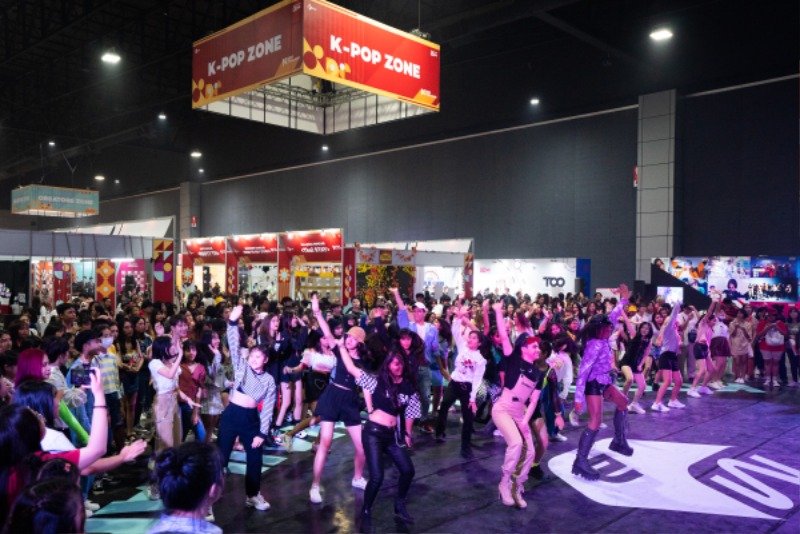From BTS to director Bong Joon-ho’s Oscar-winning “Parasite” and the Netflix original series Kingdom,” Korean cultural content is taking the world by storm. This unprecedented global spotlight has extended to encompass the Korean language and , Hangeul, as well.

Students of King Sejong Institute (KSI) from around the world hold up their favorite Korean words to celebrate Hangeul Day 2020. KSI is a global network of Korean language education and cultural institutes operated by the Korean government. As of 2021, there are 234 institutes in 82 countries.
© King Sejong Institute Foundation
Until just a few years ago, foreigners fluent in Korean were a rarity. This helped the TV variety show, “Non-Summit” (2014-2017), which aired on JTBC, to make a big splash. Audiences watched in amazement as the international panel, composed of young foreign residents from various parts of the world, engaged in heated debate on diverse topics – all in fluent Korean. But now, foreigners who seem even more proficient than native speakers are a common sight on TV. Many of them say that the appeal of Korean cultural content motivated them to learn the language and settle down in Korea.
The term hallyu, or Korean Wave, referring to the overseas craze for Korean popular culture, was coined in the 1990s when Korean TV dramas debuted in China and Southeast Asia. In the early 2000s, “Winter Sonata,” a heart-tugging portrayal of first love, became a huge hit in Japan. Then, in the 2010s, K-pop began building a steady fan base extending beyond Asia to the United States, South America and Europe. The growing popularity of Korean dramas and pop music among overseas audiences naturally stoked interest in learning the Korean language and , Hangeul, in hopes to better understand dialogues and song lyrics.
The surging interest in Hangeul and Korean is not just driven by the huge success of popular content – it’s also telling of a broader shift in trends across the world.

K-pop fans pose in front of walls covered with messages supporting their favorite artists at KCON 2019 THAILAND, held on September 28-29, 2019, in Bangkok.
© CJ ENM
K-Pop Festivals
Entertainment juggernaut CJ ENM organizes a K-pop festival, dubbed KCON, which is held annually in different cities across the world. Since its inception in 2012, the event has expanded in scale and scope, comprising music, dramas and movies as well as products ranging from IT to fashion and beauty. The two-day iteration of the festival held in Bangkok in October 2019, just before the outbreak of COVID-19, attracted 45,000 people. Fans of K-pop tend to naturally develop an interest in Korean products, such as soju (clear distilled liquor), ramyeon (instant noodles) and cosmetics. At KCON, they line up in front of booths displaying these and other Korean goods, then instantly break out into dance and sing along to the lyrics when a K-pop act comes on stage.
An eye-catching feature at these events are walls filled with messages written by fans in support of their favorite artists. Among them, it’s not hard to spot Korean expressions, such as saranghaeyo (“I love you”), eungwon hamnida (“I’m rooting for you”) or neomu joayo (“I like you so much”), written in Hangeul. At KCON Bangkok, Nichkhun, the host and a Thai member of the Korean boy band 2PM, spoke in both Thai and Korean. Surprisingly, quite a few Thais in the audience could be seen laughing and cheering at his Korean comments without any translation.
In Thailand, K-pop has fueled a language-learning boom. In 2010, Korean was first adopted as a regular subject in the country’s public secondary schools. Today, it has over 40,000 students. And enthusiasm for Korean has grown even further since it became one of the foreign language electives for college entrance exams in 2018.
BTS and ARMY
Of course, no one would deny the role of BTS in spreading Hangeul and the Korean language. In 2012, Psy’s “Gangnam Style” was the biggest global hit of the year. People around the world, including celebrities, sang and danced along, shouting the refrain, “Oppan Gangnam style.” But few knew what it meant. Compare this to BTS, who topped the Billboard Hot 100 songs chart for 10 consecutive weeks (as of August 7) with their latest hits, “Butter” and “Permission to Dance.” BTS have inspired fans around the world to learn Korean in order to understand the messages behind their songs. Nothing has encapsulated this phenomenon more explicitly than a fan placard saying, “Thank you for teaching us to love ourselves,” written in Korean, spotted at the group’s 2018 Citi Field concert in New York.
Korean is also used to harness the formidable influence of BTS’ fandom, ARMY, in rallying the support of the international community. In 2020, for example, Armenian girls posted photographs of themselves on social media, posing with placards reading, “We want peace,” written in Hangeul, in a plea to stop the armed conflict between their country and Azerbaijan. Early this year, K-pop fans posted “Please help Myanmar” in Hangeul on social media, pleading for assistance to the Myanmar people’s resistance against the country’s military coup.

K-pop fans sing along and learn dance moves at KCON 2019 THAILAND, a two-day event held at Impact Arena and Impact Exhibition Center. KCON is a K-pop festival organized by CJ ENM that has been held annually in different cities across the world since 2012.
© CJ ENM
A Sense of Community
K-pop has certainly played a catalytic role in the ongoing surge in global interest in the Korean language. However, other genres and media have helped as well. A notable example is the word meokbang (aka mukbang, literally “eating broadcast”), which has now been adopted as a proper noun worldwide amid the explosive popularity of YouTube videos of people eating. At times, Korean words can also communicate unique aspects of Korean society and culture, as depicted in TV dramas that are streamed on global platforms like Netflix. Some examples include kkondae, referring to old fogeys who enforce their views on younger people as if their knowledge and experience are the absolute standard; hwabyeong (literally “anger disease”), an emotional disorder caused by repressed anger and frustration, typically associated with women; and podaegi, a quilted baby carrier traditionally used by mothers to secure their baby on their back.
The spread of Korean words can be attributed primarily to the appeal and impact of popular culture. But another compelling factor is the rise of social media platforms, which offer a window into the unique charm of local cultures that have been undervalued or overlooked. In particular, online video platforms like YouTube connect people to diverse cultural content in other parts of the world, promoting a sense of community that transcends national boundaries and language, and sparking a desire to learn about other cultures. Interest in the Korean language can also be seen as stemming from this larger global trend.
In our digitally connected world, the appeal of a specific individual or content carries much greater weight than before. On the Korean holiday commemorating the proclamation of the Korean alphabet, Manchester United Football Club posted “Happy Hangeul Day,” written in Hangeul, on its official social media channel. This can be seen as a gesture of respect for the club’s former Korean midfielder, Park Ji-sung.
In his Golden Globe acceptance speech for best foreign language film for “Parasite,” preceding his four Oscars, director Bong Joon-ho said, “Once you overcome the one-inch-tall barrier of subtitles, you will be introduced to so many more amazing films. I think we use only one language – cinema.”
As Bong implied, language is no longer a barrier on the global stage. The surging interest in Hangeul and Korean is not just driven by the huge success of popular content – it’s also telling of a broader shift in trends across the world. This means that, going forward, Korean content needs to be more in tune with universal sensibilities and values. The time is ripe for Korean content and language to play their part in the cultural enrichment of the global community.
Jung Duk-hyun Popular Culture Critic